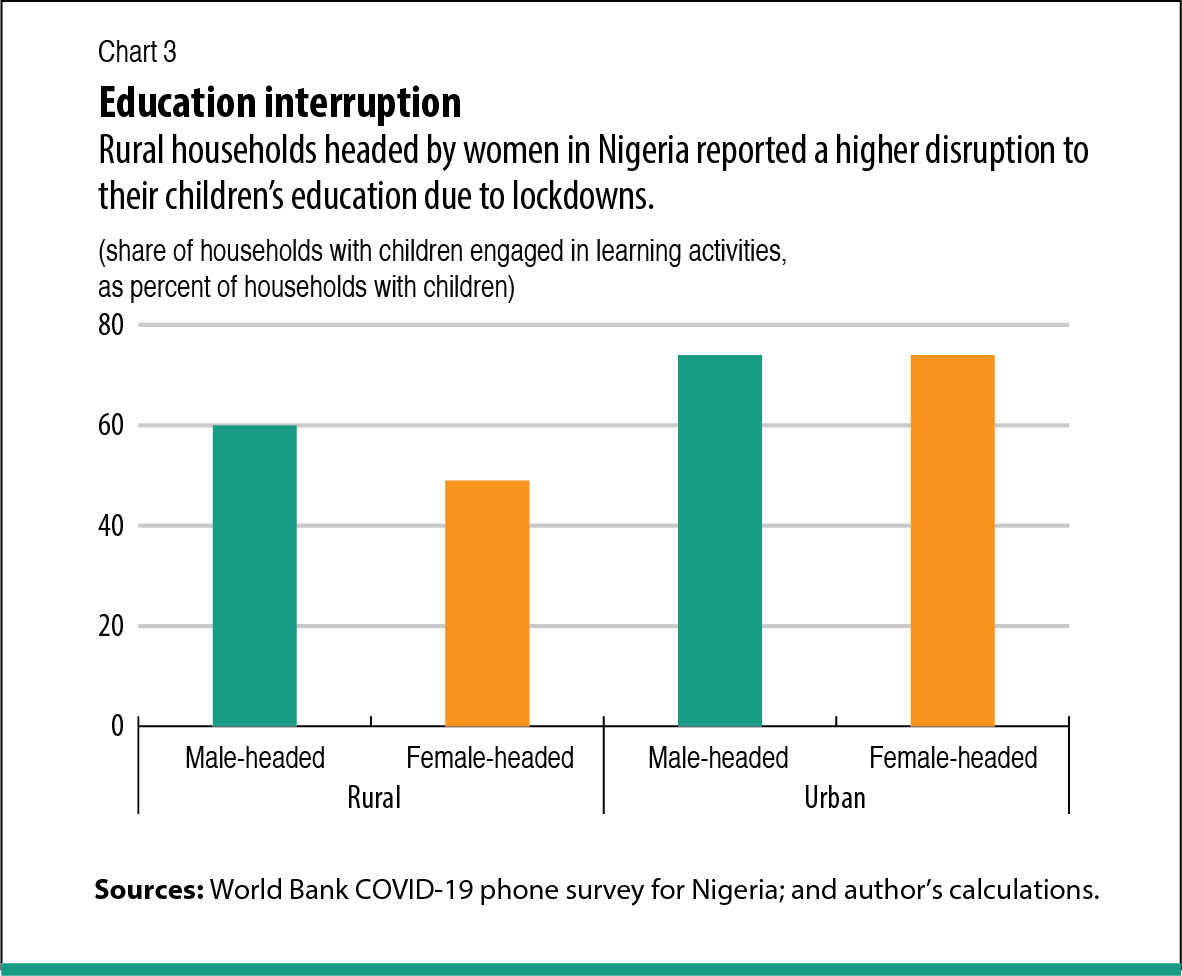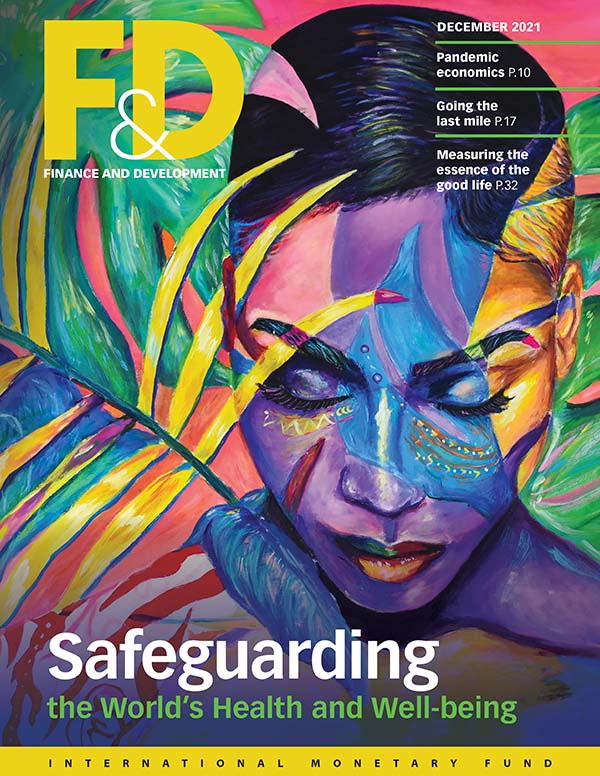Women have fared worse during COVID than men as the rural‑urban divide deepens and income falls across sub-Saharan Africa
In sub-Saharan Africa, the gender inequities of the COVID-19 pandemic follow different paths but almost always end up the same: women have suffered disproportionate economic harm from the crisis.
Rural or urban. Educated or uneducated. Formally employed or self-employed. The nuances of how women have fared worse than men in the crisis are becoming clearer with the availability of more high-frequency data. A targeted set of women-centered policies can blunt the negative impact of the crisis and improve prospects for the next generation.
New IMF staff research shows that self-employment among most women could mask the economic impact of the crisis on them. The divide between women in urban and rural settings also makes a difference. Women in cities may be more prone to lose their jobs, whereas women in rural areas are more likely to be self-employed and face greater challenges to keeping their children in school.
Regardless of where a woman lives and works, the shocks to household income are widespread. Even before the pandemic, a woman in sub-Saharan Africa was more likely than a man to be under the threat of poverty. According to International Labour Organization statistics, 81 percent of female workers, compared with 77 percent of male workers, were either extremely, moderately, or close to poor in 2019.
The fact that women were more likely to work in the hard-hit services sector—leisure, hospitality, and retail sales—only magnified the income disparity. In urban areas, the share of female employment in the services sector was as high as 74 percent, whereas that of male employment was 59 percent in 2019.
The situation on the ground
High-frequency phone surveys conducted by the World Bank allow us to zoom in on countries to assess the pandemic’s impact. The first round of the survey, conducted in Nigeria during April–May 2020, coincided with a federally mandated lockdown and provides a glimpse into the challenges facing countries across the region.
First, a job loss or business closure due to lockdown in Nigeria was more common for urban than rural areas and among male rather than female workers (see Chart 1). Rural employment may have been less affected by the lockdown because of lower enforcement of restrictions in remote areas or exemptions for essential agricultural and related activities. The lower employment loss among women may result from the high share of informal self-employment: women have little choice but to continue working even if the returns to their efforts decrease substantially.
Female employment losses appear to be more severe in other parts of the region. More recent results from the phone surveys of other sub-Saharan African countries (Ethiopia, Malawi, Uganda) found that in Ethiopia and Uganda more women than men lost their jobs because of COVID-19. The prevalence of informal self-employed workers, especially women, in those countries implies that the shock to female employment is even greater.
The second finding from the initial Nigerian survey is that even though employment loss was less severe in rural than urban areas, income reductions are widespread. In both rural and urban areas, about 80 percent of households reported lower total household income since the outbreak.
When we further parse the data, it is apparent that even though self-employed and informal workers may be less likely to lose their jobs, household farming and nonfarm family businesses workers are more likely to lose income than those receiving formal wages (see Chart 2). The vulnerability of informal workers may have a particularly adverse effect on women because of their dependence on family farming and family businesses.
The costs of the pandemic for women aren’t limited to lost income. They also cascade onto their children, harming future generations. The study finds that rural households headed by women are far less likely than urban households to have children engaged in learning activities during school closures (see Chart 3). Female-headed households are vulnerable and different in many ways from the average household, not because they are headed by women but because of what leads women to become a head of household. The majority of female household heads in Nigeria are widows. All else equal, female-headed households are, on average, 12–14 percentage point less likely than male-headed households to continue educating their children during the pandemic. In contrast, urban households and households with a nonagricultural worker are on average slightly more likely to sustain children's learning.
Compared with children in urban areas, children in rural areas were lagging academically even before the pandemic. Yet these results imply that the urban-rural gap is widening during the pandemic—rural children do not have the same internet connectivity, rural schools are less equipped to offer remote learning, and children are more likely to be expected to work to support their household.
While these main survey results are for Nigerian households, there is a similar geographic and gender divide in other countries in sub-Saharan Africa. Reflecting the different challenges women and men are facing, more than 60 percent of governments in the region have introduced gender-sensitive policies as a response to the COVID-19 crisis (UNDP-UNWomen 2020). For example, the governments of Côte d’Ivoire, Liberia, and Senegal have introduced measures to facilitate access to small business loans during the COVID-19 pandemic; most beneficiaries are women. The Democratic Republic of the Congo and South Africa have initiated a range of fiscal measures to support female-dominated sectors of the economy, such as hospitality and tourism. In Kenya and Rwanda, some in-kind and cash transfer programs prioritize women in beneficiary households or are targeted to female-headed households. These are encouraging signs, but there is room for acceleration and scaling up of policy measures to support women and families to narrow regional and gender inequalities.
Women-centered policies
Cash transfers can be more targeted toward households hit by the shock. Social cash transfers play a key role in sub-Saharan Africa, where unemployment insurance is still uncommon and informality is pervasive. In the face of the COVID-19 crisis, it may make sense to strengthen cash transfers in urban areas by linking them to rising unemployment in the local labor market.
Policies can be expanded to enhance skills training and education for women to equip them for decent jobs. An example is the Jobs for Youths and Women Post Covid-19 initiative in Nigeria, which trains women in digital skills and entrepreneurship and supports job creation through the provision of start-up capital. Training women and girls would also help mitigate lasting effects of the pandemic on educational inequality. In Sierra Leone, during the Ebola crisis, various life-skills and livelihood training programs for girls in areas disrupted by the epidemic helped them return to school after schools reopened.
Improving digital infrastructure and access to devices and the internet is important. Eradicating the digital divide is critical for women and the rural population to take advantage of education, learning a skill, new jobs, and financing opportunities. During the pandemic recovery phase, greater internet accessibility could provide more jobs for women in the services sector and would support inclusive growth in sub-Saharan Africa. An earlier study on the phased arrival of undersea cables in the region supports this hypothesis; it found that the shift to more employment in services is two and a half times larger for women than for men (IMF 2020; Georgieva and Selassie 2020).
Finally, formal employment-linked policies to support unpaid care work need to be strengthened. These policies include paid family leave, cash-for-care programs, flexible and shorter-work-time arrangements, and continued childcare services, including for essential workers. Such measures are extremely scarce in sub-Saharan Africa. Even after schools reopen, women around the world will continue to shoulder responsibility for childcare, elderly care, and housework as people are encouraged to stay home to contain the spread of the virus. Policies to support caregiving not only facilitate female participation in formal jobs but help female-headed households in particular: they reduce the burden on mothers and could have a positive influence on their children’s learning.
Regardless of where a woman lives or how she is employed, policies need to reflect the significant role that women often have in their homes and communities and the impact that has on future generations. Supporting women not only provides important short-term economic benefits, it is a vital building block for a more prosperous and inclusive future.
References:
Aoyagi, Chie. 2021. " Effects of COVID-19 on Regional and Gender Equality in Sub-Saharan Africa: Evidence from Nigeria and Ethiopia ." IMF Working Paper 2021/169, International Monetary Fund, Washington, DC.
Georgieva, Kristalina, and Abebe Aemro Selassie. 2020. “ Charting a Path for a Resilient Recovery in Sub-Saharan Africa .” IMFBlog, September 15.
International Monetary Fund (IMF). 2020. Regional Economic Outlook: Sub-Saharan Africa . Washington, DC, April.
UNDP-UNWomen. 2020. " COVID 19 SSA Regional Factsheet ." United Nations, New York.
Opinions expressed in articles and other materials are those of the authors; they do not necessarily represent the views of the IMF and its Executive Board, or IMF policy.












